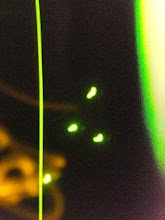
I saw WALL-E yesterday, a film that I'd been looking forward to for more than a month, ever since I got a really good look at it after listening to an interview with Andrew Stanton, the director. I found the movie pretty fantastic aside from some controversy involving the film's title (well, not real controversy - apparently it's okay to punctuate it with a dash and not the neato interpunct that they've been using on the posters. Yes, I did just learn that word).
It's not my job to convince you that the movie's great; critics around the world could tell you that. Unlike the last couple Pixar movies (Cars in particular), this plucky little flick seems like the sort of movie that could really grow on you. Not necessarily on the day that you see it in the theaters, amidst all of the hype and hubbub, but years later, when the DVD is resting up on the kids'-level shelf with the rest of Pixar's classics (meaning, of course, pretty much everything not involving insects or automobilia).
More than probably any Pixar flick before it, WALL-E is a strong argument for the subtle art of storytelling. Without spoiling anything, the best and most revelatory parts of the film are primarily nonverbal. Remember when R2-D2 said far more through his beeps, burbles and urgent fidgets than prissy, nagging C-3P0 ever managed to communicate? That same energy is at work here. I've grown spoiled by being able to watch a Pixar film without having to deal with catch phrase-dependent comic relief characters voiced by the likes of Wanda Sykes or Ben Stiller, but WALL-E is nearly completely independent from celebrity influence, understated presence of Sigourney Weaver notwithstanding.
I'll be discussing a couple of my favorite elements of the film in the next couple of paragraphs, as well as discussing a concern that others have had with the film, so those wishing to know nothing else about this fairly new flick may wish to stop here:
The film's storytelling carries over into the landscapes, primarily during the first half of the film. Mountains of garbage and a garbage-colored robot construct the film's bleak optimism. Humans have essentially turned the planet into a giant trashpile, under the watchful eye of a well-meaning yet ultimately destructive global corporation, who reassures the human race that everything will be taken care of planetside while they stay fat and happy on giant spacefaring luxury liners.
What's interesting is that the film never stoops to the level of a message film - the specifics of the story are necessary only to set up the characters and conflict, and the commentary on human nature is unambiguously positive. I found it fantastic that when we actually meet the humans, they aren't petty, selfish, apathetic, uncaring or anything else that you'd expect them to be in a film like this. Quite the contrary - lethargic and pampered as these doughy blobs may be, they're unfailingly kind and understanding, even resourceful and industrious when given the chance. Again - not the obvious, cynical path for the movie to tread, but something far more significant. (Predictably, self-conscious neocons have gotten their britches in a bundle about the perceived environmental messages in the story, proving that they're once again missing the point.)
Secondly, Pixar's gotten far better at integrating their gags with their stories. Pixar stopped including "bloopers" in their closing credits around the time that they began to take the films more seriously as stories rather than straight comedies. Charismatic and classic as Toy Story 2 or personal fave Monsters, Inc was, it's plain that Pixar has taken a different tonal approach with their movies beginning with Finding Nemo. Portraying your characters as actors in a movie just doesn't scan when your audience has to take the grief and love shown onscreen in any serious light. This isn't to say that they've lost the slapstick touch - the traditional short before the film is as clever and madcap as anything we've seen since the days of Looney Tunes - you can watch it here until YouTube takes it down).
WALL-E may be a kids' movie (certainly it appeals to kids), but it's as significant and genuine as anything you're likely to see in the top 10 this or any year. I highly recommend it.
On a related note, I like to think that I've shown remarkable self-restraint throughout this post by not referencing the imminent release of Hellboy II. Dagnabbit!


No comments:
Post a Comment
Thanks for commenting - I reserve the right only to delete ads, nonsensical spam or comments indistinguishable from such.
Note: Only a member of this blog may post a comment.